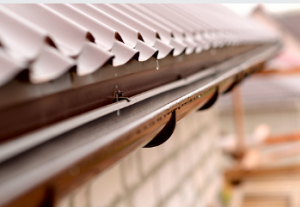There are several different types of gutter guards, and it is helpful to know what each type does to protect your home’s roof. Here’s an overview of each type, including Surface-tension, Steel, and Screens. If you’re interested in protecting your roof from debris, gutter guards are a great option. The pros of these gutter covers outweigh the cons, and there are several different benefits. Discover which type is best for your home here.
 Screens
Screens
When considering which type of gutter guard to install on your home, there are a few factors that you should consider. First, while the main function of gutter guards is to prevent leaves and other debris from entering the gutter, it is essential to consider the weight of debris. These factors are especially important during the winter months when the weight of the snow and ice is much greater. In addition, depending on the material used to make the screen, you may have to take it out periodically to clean it.
Micro-mesh guards are the most common type of screen gutter guards. These types are similar to mesh gutter guards but have smaller holes to allow water to flow through. Micro-mesh guards are more expensive and require professional installation. They are also less flexible than foam. If you have a gutter with a mesh screen installed, you should get one made from a strong material that can withstand weather extremes.
Brushes
One of the best ways to ensure that your gutter guard is working properly is to get a brush for it. These specialized tools have bristles on the front that prevent larger leaves from getting caught and blocking water flow. These brushes can also help you clean out the soffit under the eaves of your house. While the brushes are not perfect, they are a great option for homeowners concerned about debris and want to keep them clean.
Other products that you can use are foam and sponge, and gutter guards. These are extremely cheap and will only provide temporary protection for your gutter. You can find them at DIY hardware stores and Big Box Home Centers. Some people recommend these products because they are easy to install and offer long-term relief from debris build-up. However, these items do not provide adequate protection. They may not be the best option for your gutters, so beware of foam and sponge gutter guards.
Surface-tension
One type of surface-tension gutter cover is a screen. These types are very simple to install. The screens are angled to allow water to flow over them and then reverse and slide back into the gutter. These are often the most economical gutter guards and cost less than 50 cents per foot. Unlike the other gutter guards, these screens cannot keep out all debris, including tiny twigs and seeds. However, they do require periodic cleaning. Learn more about gutter guards DIY.
Another type of surface-tension gutter guard is the reverse curve type. This type is designed to last for several years. Although most models are meant to be installed without cleaning, they require occasional maintenance. Because rain falls directly on their top surface, most dirt is washed away by the guard. Dirty water can build up in the gaps in these gutter guards and prevent water from flowing properly.
Steel
When you are looking for a cost-effective way to protect your home’s gutters from debris, steel gutter guards are great. They are made from a durable, heavy-duty aluminium mesh that allows water to drain properly while blocking smaller twigs and leaves from getting into your gutters. In addition, these guards can be installed easily without any tools and are easy to remove if they become clogged.
The price of these guards varies greatly, depending on their design and additional options. Options such as copper frames, heated frames, and tighter mesh will cost more. However, Valor gutter guards are priced competitively with other high-quality manufacturers. Learn more about gutter guards DIY.
Using gutter guards will prevent several common pest infestations. Unprotected gutters attract squirrels, birds, and other pests. Insects and rodents can also breed in these areas. Gutter guards create a physical barrier that prevents these pests from entering your home through the roof space and fascia board. Gutter guards also prevent rusting of your gutters. You can hire a professional to install them if necessary, but they’re well worth it.
Installing gutter guards can be tricky. If not installed correctly, they can cause more damage than good. But, again, using a professional can help. Regardless of how well you know your way around a DIY project, a gutter guard is something you shouldn’t put off. It would be best if you were prepared to spend some money, but make sure it’s done properly. It’s better to be safe than sorry. You’ll be glad you did!